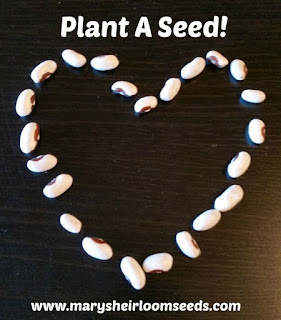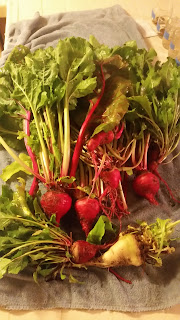Protecting Seed Diversity & Our Future Posted on 6 Jun 18:29 , 0 comments
At Mary's Heirloom Seeds, we often talk About HOW to plant and WHEN to plant.
I realize that we don't talk enough about the WHY we plant Heirloom Seeds.
I realize that we don't talk enough about the WHY we plant Heirloom Seeds.
Today, three corporations control 53 percent of the global commercial seed market.
Read that sentence again and let that sink in...3 corporations OWN over half of the global commercial seed market!
In 2013, the Center for Food Safety published a report Seed Giants VS U.s. Farmers. This report documents corporate control of seeds, links to loss of seed innovation, rising seed prices, reduction of independent scientific inquiry, and environmental issues.
"In the last few decades, the U.S. has led a radical shift toward commercialization, consolidation, and control of seed ownership. Three agrichemical firms—Monsanto, DuPont, and Syngenta—now control 53 percent of the global commercial seed market. The top ten seed firms, with a majority stake owned by U.S. corporations, account for 73 percent."
Among the report’s discoveries are several alarming statistics:
· As of January 2013, Monsanto, alleging seed patent infringement, had filed 144 lawsuits involving 410 farmers and 56 small farm businesses in at least 27 different states.
· Today, three corporations control 53 percent of the global commercial seed market.
· Seed consolidation has led to market control resulting in dramatic increases in the price of seeds.
From 1995-2011, the average cost to plant one acre of soybeans has risen 325 percent; for cotton prices spiked 516 percent and corn seed prices are up by 259 percent.
Additionally, Seed Giants vs. U.S. Farmers reports a precipitous drop in seed diversity that has been cultivated for millennia. As the report notes: 86% of corn, 88% of cotton, and 93% of soybeans farmed in the U.S. are now genetically-engineered (GE) varieties, making the option of farming non-GE crops increasingly difficult.
While agrichemical corporations also claim that their patented seeds are leading to environmental improvements, the report notes that upward of 26 percent more chemicals per acre were used on GE crops than on non-GE crops, according to USDA data.
Also in this report "Many assert that present-day seed patenting policies are needed in order to feed the planet. However, as Nobel laureate Amartya Sen has shown, hunger is fundamentally a problem of poverty, food distribution, and inequity. The United Nations General Comment on the Right to Food concurs: “The roots of the problem of hunger and malnu-trition are not lack of food but lack of access to available food.” Even though we currently grow enough food to feed the world, more than one billion people go hungry. Another two billion suffer health problems, including malnutrition, from being overfed with unhealthy food. For example, today, the number of children suffering from obesity almost outnumbers those children suffering from hunger.
Also in this report "Many assert that present-day seed patenting policies are needed in order to feed the planet. However, as Nobel laureate Amartya Sen has shown, hunger is fundamentally a problem of poverty, food distribution, and inequity. The United Nations General Comment on the Right to Food concurs: “The roots of the problem of hunger and malnu-trition are not lack of food but lack of access to available food.” Even though we currently grow enough food to feed the world, more than one billion people go hungry. Another two billion suffer health problems, including malnutrition, from being overfed with unhealthy food. For example, today, the number of children suffering from obesity almost outnumbers those children suffering from hunger.
Unfortunately, some of the largest "organic" seed suppliers in the US also purchase their seed stock from Seminis (Monsanto).
At Mary's Heirloom Seeds We do not, nor have we ever, sourced seeds from any agrichem company such as seminis.
From GMO Journal, "Since genetically modified crops (a.k.a. GMOs) reinforce genetic homogeneity and promote large scale monocultures, they contribute to the decline in biodiversity and increase vulnerability of crops to climate change, pests and diseases."
What does all of this mean?
On a personal level, I do not want to put my family's future in the hands of Agri-Chem corporations. Depending on store-bought food, grown from questionable seed stock is NOT the way I want to live.
From Food Security, "Without a strong base of diverse seeds, food production is threatened by disease and climate change. Promoting the use of diverse seed types enhances food security and promotes the preservation of traditional cultural practices and values. Seed security can come from preserving seeds in an underground bunker, but at a more pervasive level seed security comes from seed sovereignty and the right to use and exchange seeds freely within a community."
From a 2011 National Geographic article, we have an infographic of seed variety loss.

Using the metaphor of a tree, it charts the loss of U.S. seed variety from 1903 to 1983. And what you see is that we’ve lost about 93% of our unique seed strands behind some of the most popular produce
What can we do to PROTECT ourselves ?
Before you take your next bite of food, be conscious of where it came from and ask yourself if you are supporting the people who poison the planet or those who are trying to protect it.
When you GROW your own food from heirloom seeds, you are continuing a tradition documented for generation. Seed saving is imperative. We must protect our seed diversity. Now more than ever, every bite we take and every seed we plant has the potential to shape our future
We've posted several articles about getting started as well as seed saving &storing on our blog. It has become obvious to me that WE must be in charge of our food supply. WE must protect our seed diversity. WE must make a stand against these seed monopolies before it is too late.
Are you interested in GROWING your own Organic Food but not sure where to start? Below are a few links to help you get started


